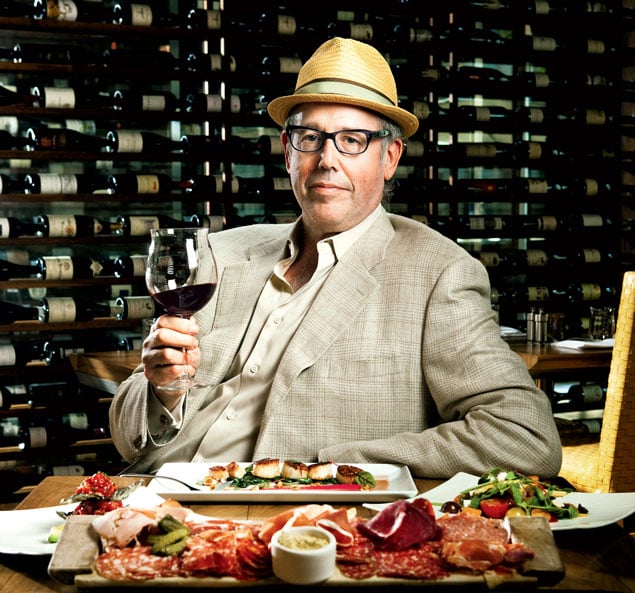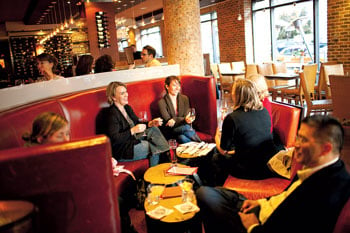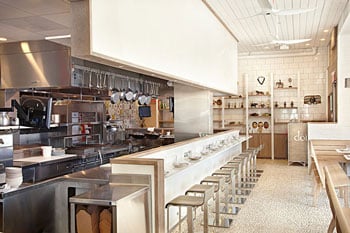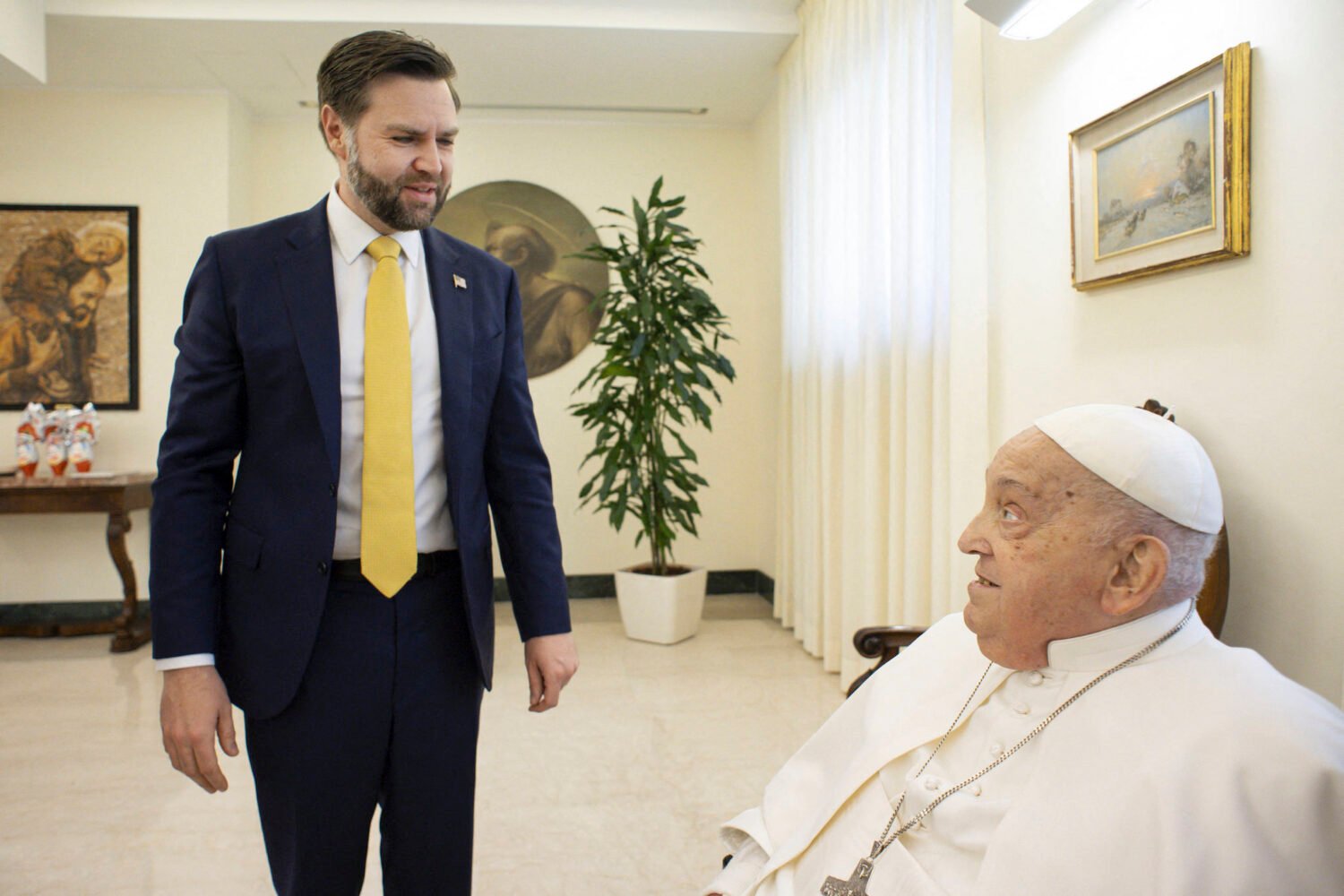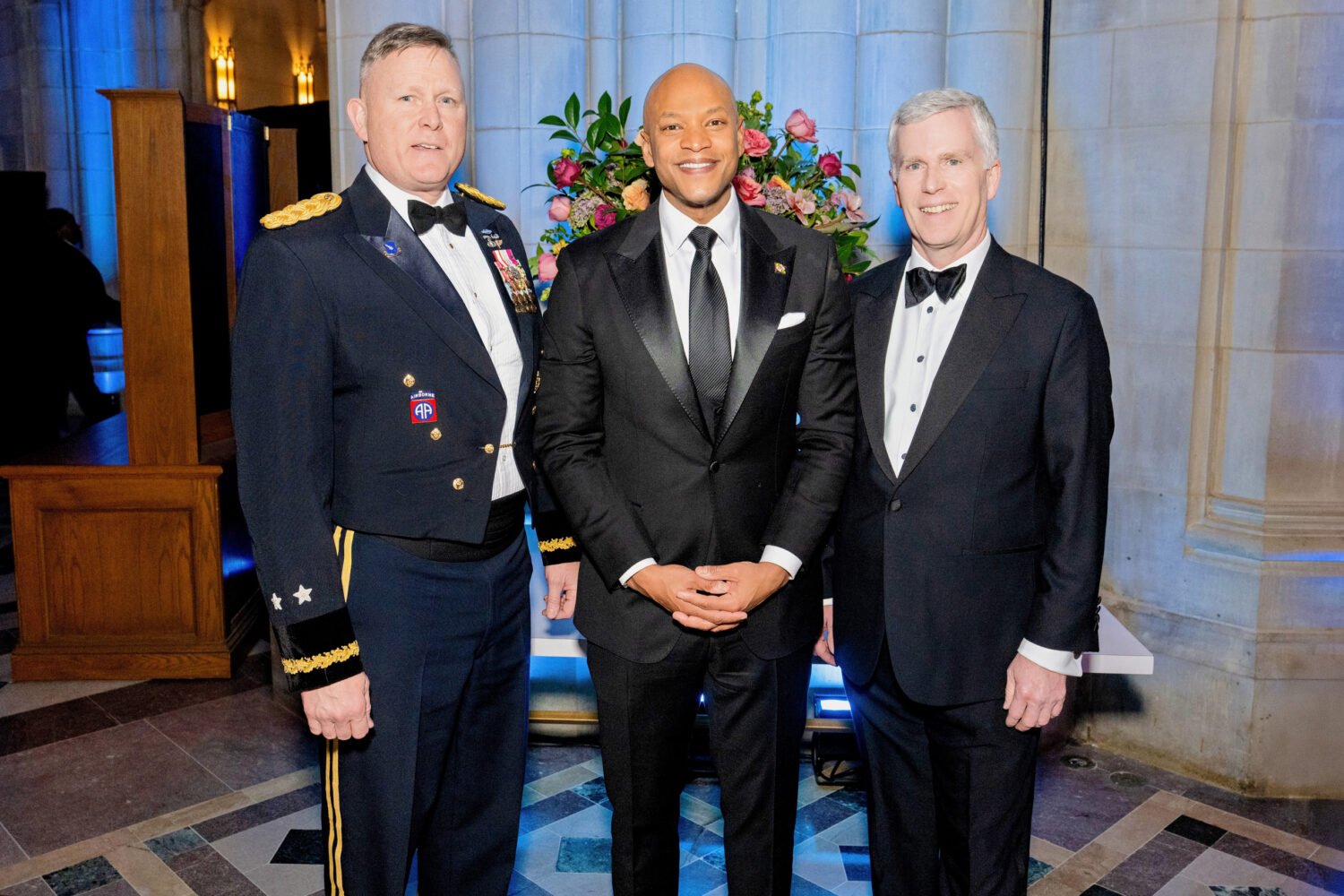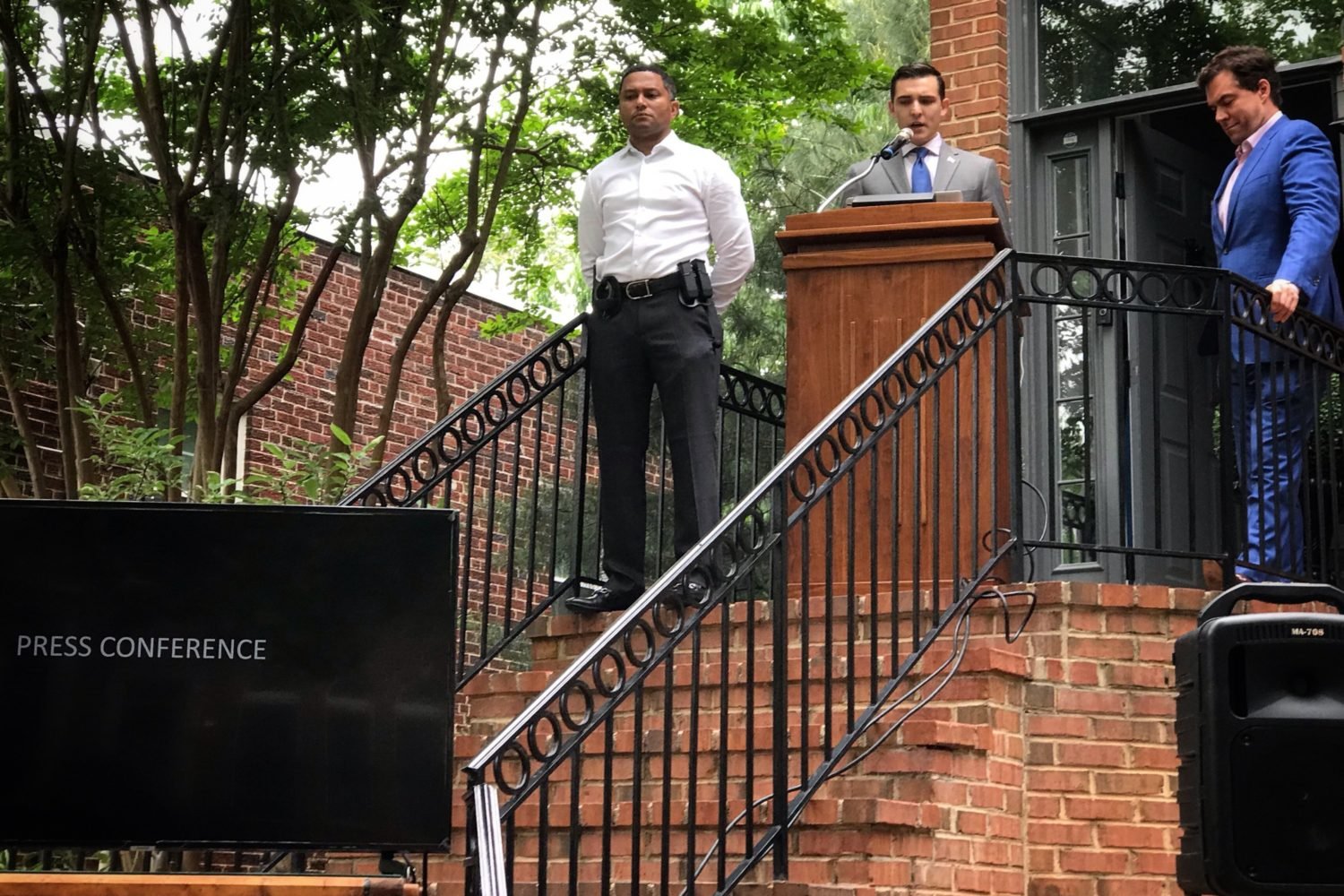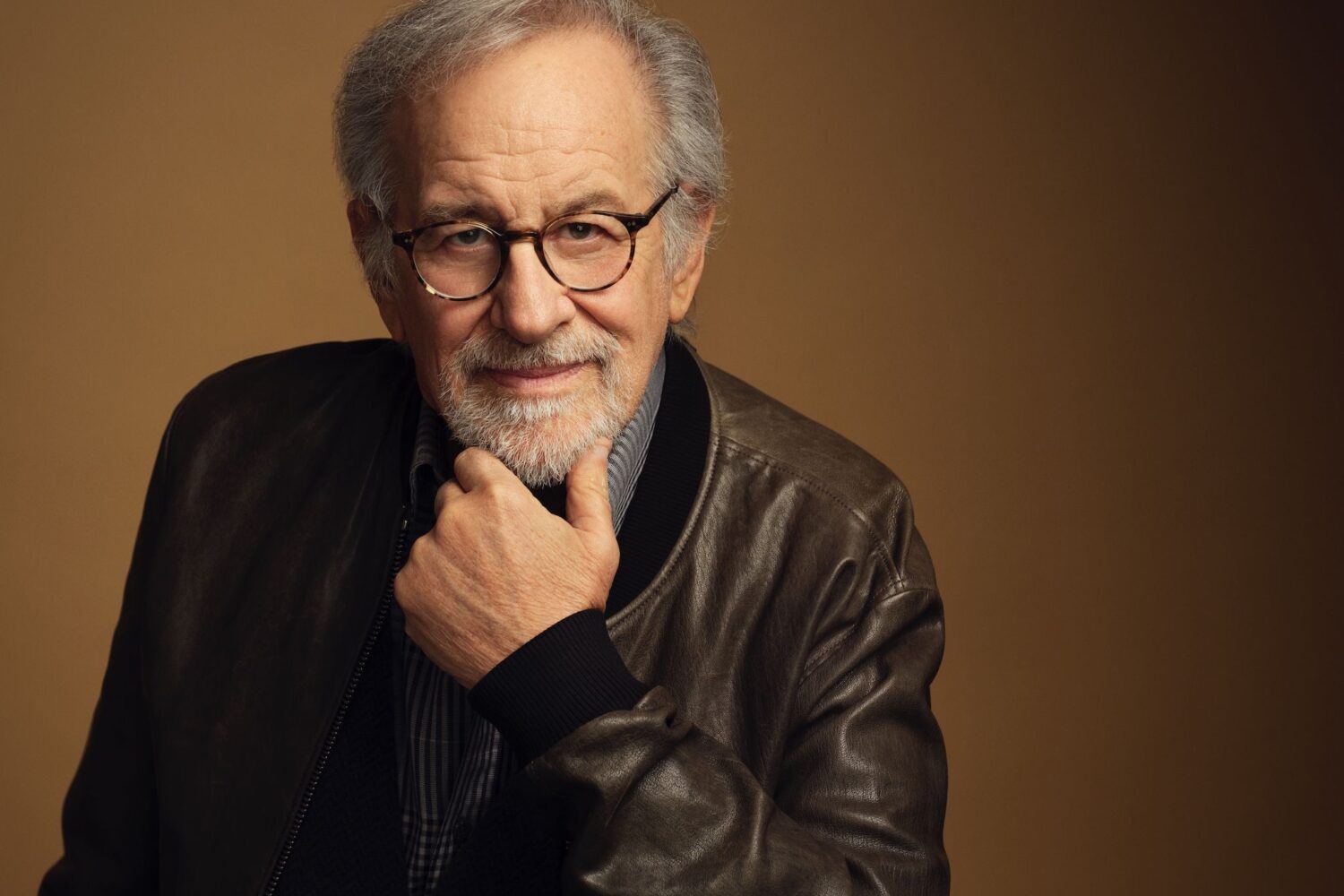A week before his 60th birthday last December, Mark Kuller walked into Ruan Thai in Wheaton with a thick black binder under his arm. A tax lawyer turned restaurateur, Kuller still was doing consulting on the side for longtime clients, and it was only natural to wonder if he was preparing for a case.
“This?” he said, letting out a loud, squawking laugh. “This is the contents of my cellar.”
With the big 6-0 looming, Kuller—who owns Proof in DC’s Penn Quarter and Estadio in Logan Circle—had asked one of his staffers to catalog his 7,000-bottle wine collection, and the product of that epic but not thankless task (the employee’s reward: World Series tickets) was this binder.
A man with the soul of a boulevardier and the brain of an actuary, Kuller isn’t one for half measures, and he didn’t come to one of the area’s foremost Thai restaurants merely to eat a late lunch. He had a purpose. Kuller is regarded in the restaurant community for approaching his new line of work with the fanatically meticulous preparation with which he approached his legal work.
A few months earlier, he had consumed more than 100 meals in three weeks, gorging himself on the cooking of Thailand and Vietnam with his executive chef, Haidar Karoum. A year before that, Kuller had spent a couple of weeks exploring the most renowned Thai and Vietnamese kitchens in Los Angeles, San Francisco, and Portland. It was all part of a yearlong effort to school himself in the nuances and complexities of the dishes that would make up his menu at the Southeast Asian-influenced Doi Moi, his third restaurant, slated to open in mid-August off Logan Circle.
Now, as he waited this afternoon for the first of seven dishes to arrive, Kuller—his old-school Bullets cap perched on his head, his glasses off—paged through his sheaf of spreadsheets, deciding which of his 7,000 wines he’d bring to the birthday bash he was throwing for himself.
To commemorate the “hideous milestone” of turning 60, he had rented out 2 Amys, the popular Cleveland Park pizzeria. A hundred of his closest friends were coming. It was important that they not only eat well—Peter Pastan, the chef at 2 Amys, would see to that—but drink well, too.
“I was thinking about a bottle or so per person,” Kuller said.
Was this maybe a little excessive?
“No such thing,” Kuller said. All that was missing was the judge’s gavel.
Kuller is large—six-foot-six—and his outsize personality makes him seem even larger. He lopes through rooms with the swagger of a man who possesses some secret knowledge, dresses as if he’s never given a thought to anyone’s opinion, and curses like a standup who relishes working blue. The adjective “Falstaffian” was made for men like Kuller. His appetites—for food, for drink, for the good life, and, before he recently remarried, for women—are enormous.
One night last January, I sat courtside with him at a Wizards game, where, before shouting down the refs (“He f—in’ hacked him, ref!”), he downed a hot dog with sauerkraut, a roast-beef sandwich, some Swedish meatballs, and a beer. After the game, we settled into a booth at Proof, across the street from the Verizon Center, for a bite: two salads, two pâtés, a flatbread, some foie gras, and a couple of glasses of wine.
“I’m minding my diet,” Kuller had said before placing the order.
It’s hard, when you’re in his booming presence, to fathom that he wasn’t one of those men who come stomping out of the womb and begin imposing their will on life not long after they leave grade school. But in fact, Kuller is the product of a transformation so unexpected, so extreme, that the transition from tax attorney to restaurateur seems comparatively insignificant.
• • •
In Judaism, there’s a rabbinical concept that aims to articulate the dualistic nature of man and the universe—the yetzer hatov and the yetzer hara.
Hatov in Hebrew means “good,” and the yetzer hatov is generally translated as a force for good. In some interpretations, it’s said to be the conscience. The yetzer hara embodies a contrary impulse. Not evil exactly. But selfishness. A hunger to satisfy one’s own personal needs above those of others.
Some interpretations posit that the rabbis were intent on identifying two clear directions in life and that it’s up to people to choose which one they pursue. A Jewish version of free will. Others argue that the sages were wrestling with something far more complicated than right or wrong: the warring impulses that exist within all of us.
Kuller takes the latter view. “The Jewish yin/yang,” he calls it one day over lunch at Matchbox, a couple of blocks north of the construction site of Doi Moi, and the smile on his face is dark and knowing.
It’s a smile that says: Take it from me, I know from warring impulses.
• • •
Kuller grew up in Monticello, New York, a small town in the Catskills, the eldest of Sol and Millie’s three boys. Jason, the youngest—a lawyer and onetime standup comic—insists his mother was a saint; he calls her the “Jewish Mother Teresa.” She had a mild disposition, was kind and loyal almost to a fault, and devoted considerable time to charities and other social causes. She kept a kosher household, sent the boys to yeshiva, observed the sabbath.
Millie had staked out one extreme, Sol the other. If she was the epitome of the yetzer hatov, he was the yetzer hara. “Whatever my mother gave to the less fortunate,” Jason joked in an HBO comedy special, “was offset by what my dad took.”
Sol was a bookie who worked for the Mafia. “If anyone asks what your father does,” Millie instructed the boys, “you tell them he sells clothes.”
He did sell clothes—hot clothes that he peddled from his trunk. Sol spent nights on the phone at the kitchen table, taking bets (recorded on flash paper so he could touch them to a candle flame if the cops came) and making them, too, as he smoked his way through his pack of Pall Malls. He took pride in flouting his wife’s devotion to Jewish ritual, sneaking ham into the house and feeding it to the boys as if, Mark remembers, they were a pack of “yapping dogs.” The effect on a coddled young Jewish boy was considerable.
“Once you taste ham, it’s like smoking crack,” Jason quipped. “Pretty soon after, you’re hocking your yarmulke for bacon.”
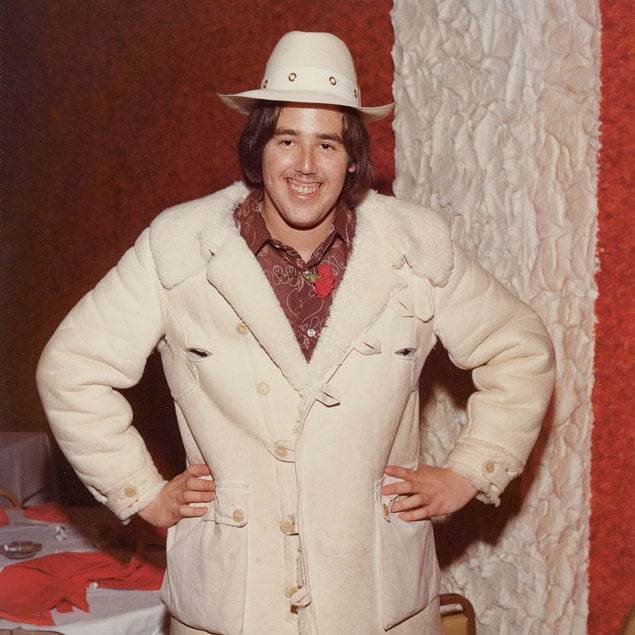
Mark Kuller was a straight-A student. As a high-school senior, he got the top score in the state on the New York actuarial exam. He was written up for his achievement in the local paper. His mother hung the article on the fridge.
His father’s reaction was more practical. A head for numbers like that? Put it to use counting cards.
Two starkly different paths had been set, and Kuller, the first to leave home, followed his mother’s. He went to NYU on scholarship, then to UCLA to study law.
He relished the times his father took him into the city to eat at Katz’s, the famous delicatessen on the Lower East Side, or any of the old-school Italian joints his dad adored, to stuff himself with sausage parmigiana and other tref treats forbidden in Millie’s kitchen.
The big, blowout meals at the fancy restaurants, when his father was flush, were something else again. He loved the way Solly would backslap the maître d’s and waiters, slipping them $100 bills. Loved the way he dressed up to go out, putting together a kelly-green jacket, kelly-green pants, and kelly-green shoes. It took more than charisma to wear an outfit like that. It took balls.
But it was his mother he tried to please. Law was serious work, befitting a serious mind. She would never go so far as to say there were no other possibilities for a brilliant Jewish boy, but the law seemed such a natural fit for his quick and analytical mind, not to mention a clear path to the secure and stable life she desperately wanted for him.
• • •
He was 17 when Millie was diagnosed with cancer, and she died during his first year of law school.
Her death broke him. Made him question God and doubt the rightness of the universe, that such a good woman could be snatched away for no good reason.
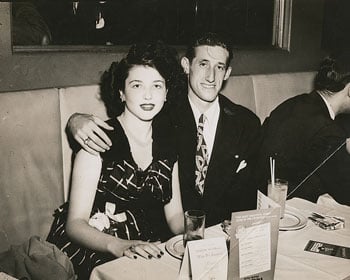
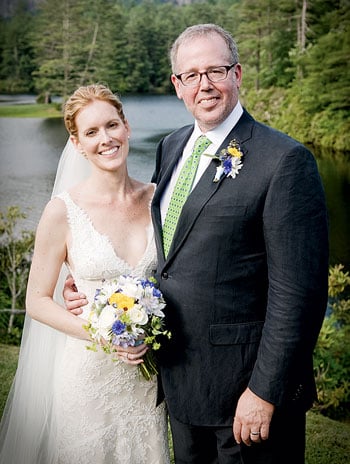
She left him in charge of her assets. She couldn’t trust that Sol, whose gambling had left them with no food on the table some nights, would do the right thing by Jason and his brother Glen. Mark Kuller became, in a sense, father to his own father and protector of his younger brothers.
He graduated from UCLA, worked at a law firm in Los Angeles, and came to Washington in 1982 to take a job at the Treasury Department, working on policies to close tax loopholes. Colleagues from that time describe him as tough, aggressive, and driven. “You have to love this work,” one of them, Rick D’Avino, says. “It’s very intense, very detail-oriented, and can be very, very draining. Mark loved it.”
He had married before leaving LA and soon had two children. He settled into the kind of existence that so many come to Washington to find—a life of long hours and constant demands but, in the slivers of free time, immense rewards.
He knew his mother would have glowed with pride. A lawyer with a bright future, a family, a big house in a nice neighborhood: It was everything she had dreamed of for him.
It was, for a long time, everything he had dreamed of for himself.
• • •
After Millie’s death, Sol had packed up and moved with Jason and Glen, both teenagers, to Las Vegas. Without the countervailing influence of his mother, the push-pull of the household was gone. It was all push.
It was mainly Mark’s influence, Jason Kuller says, that enabled him to resist the life that consumed his father. Jason came east, graduated from Georgetown and then Duke law school, and went to work for a firm in Texas.
Mark and Jason followed the path Millie had laid out for them. Glen followed Sol.
In 11th grade, Glen had written a paper for English class about harness racing—as he referred to it, “the trots.”
“There is no thrill,” he wrote, “like having the winning ticket on the horse of your choice. I enjoy it immensely.” Millie had beamed and bragged for weeks about Mark’s newspaper article. Well, so now Sol could exult, too: Glen was blossoming under his street-smart tutelage.
Sol might not have been a positive influence, but he was an inspiring teacher. Pupil surpassed mentor. Glen became the biggest bookie on the West Coast. If his father lived large, Glen lived larger. He had apartments on both coasts and spent money nearly as quickly as it came in. Restaurants, cars, clothes, women, drugs. He had a prodigious appetite and ballooned to more than 400 pounds. He had inherited Sol’s gift for jokes, and everyone who came in contact with him—upstanding citizens and criminals alike—loved to be around him.
One night, Mark joined Glen for dinner at Wolfgang Puck’s Chinois in LA. It was during the World Cup, and Brazil had just defeated Italy. Glen ordered Champagne for the entire restaurant, then stood up and, whipping his white napkin over his head, worked diners into a frenzy with shouts of “Olé! Olé! Olé!”
There was something about Glen that was deeply, scarily thrilling to Mark. Like watching an acrobat without a net. The fearlessness, going at life without hesitation or calculation. Not that he himself could be like that, even if he tried. But he always walked away from their times together with a greater sense of life’s possibilities.
And as the years went on, a greater sense of Glen’s precariousness. All the more, probably, because he was a coast away. It was impossible to be any kind of influence with that distance between them. Anyway, there were already so many other influences.
Three times Mark had gone to check Glen out of drug rehab. The question wasn’t if his brother would finally hit bottom; it was when.
It was unimaginable, Mark thought, that they came from the same family. They literally existed at opposite ends from each other. DC, LA. Establishment respectability, underworld glamour. Taxing, spending. Building a nest egg, burning through a fortune.
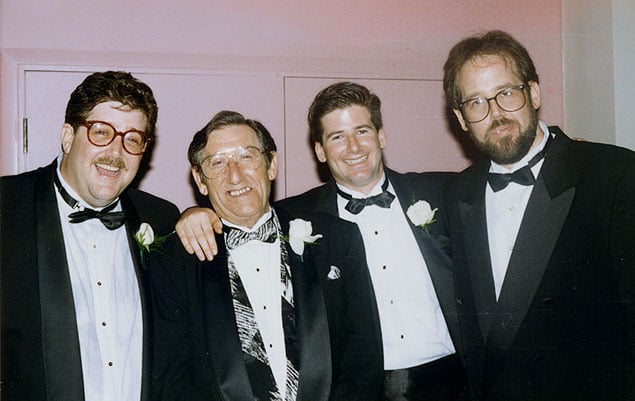
Mark wasn’t wholly unprepared for the phone call that came one night in December 1993—dead of a drug overdose, ten times the lethal limit of cocaine in his system—but it still was a blow. That great big bear of a man. Roaring with life. Unstoppable. Now dead at 35.
If Glen’s collapse was hard on Mark and Jason, it was harder on Sol. He hadn’t just lost his son; he had lost his protégé, the inheritor of the family business. Glen had taken his path. Flown down it, really. Burned up that road. And found ruin.
Before Glen’s death, Sol had been diagnosed with congestive heart failure. Nine months after Glen passed away, Sol joined him.
• • •
A funny thing happened after that.
If you were looking for a cautionary tale, you could hardly find one more convincing than Glen’s. Millie had wanted him to take life “more seriously.” Glen had flouted her wish. It was like mocking God, to mock Millie. And God had smote him.
Yet Glen’s death wasn’t just a confirmation for Mark and Jason that they’d chosen right in going down their mother’s path and not their father’s. It was, also, after they’d each cried and grieved for months, a summons. Glen might have lived a life of ill repute, but he had lived. The lawyer brothers began to suspect they were deficient when it came to knowing what life was all about. Not that they had any intention of becoming bookies and snorting coke. But surely Glen’s death was telling them something.
Glen’s path, which was their father’s, was not the way. Surely not. But they had begun to suspect—dare they even think it?—that Millie’s path might not be the way, either.
• • •
Jason was the first to jettison his old life.
He had been dabbling in standup—a few months before Glen died, he had appeared in a comedy showcase in Los Angeles—but one day he called Mark and told him he was leaving his law firm to pursue his dream. It was crazy, on the one hand—quitting his job meant quitting money, stability, a future, everything he’d spent the past ten years of his life on. He had been heading for partner. But Mark didn’t say these things to his younger brother. He told him he could always get a job at another firm. Now was the time to pursue his passion. If it was crazy, well, there was something to be said for crazy.
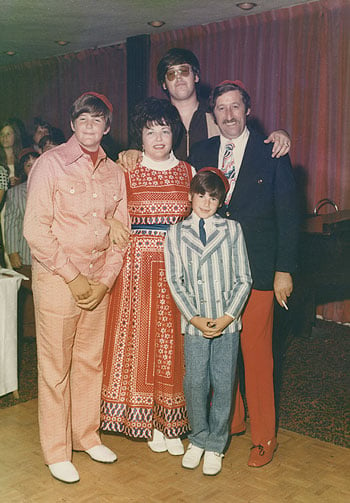
Jason worked the clubs and rose within the circuit, all the while practicing law part-time on the side. He appeared on Letterman and filmed an HBO special. He was on his way. Except he wasn’t, quite. He had difficulty elevating himself beyond a certain level. He plateaued and became pigeonholed. He lacked charisma, maybe, or the ruthless drive to succeed.
It was frustrating to Jason that he’d come so tantalizingly close to the big time. But Mark was thrilled to have come along for the ride, in the same way that being around Glen had thrilled him. Hanging out with comedians. Late nights drinking and eating and swapping funny stories. Comedy festivals in Montreal and Aspen. The greenroom at Letterman.
That Jason eventually returned to law full-time, setting up practice in Reno, was beside the point. The point was that he’d had the guts to chuck it all.
• • •
The notion of opening a restaurant first flitted through Mark’s brain in the late ’90s, not long after the two deaths.
A notion—only that.
The idea of doing something different, much less as wildly different as Jason had done, was improbable to him. He was in private practice now, at King & Spalding, creating tax shelters for corporations and pulling in close to a million a year. He had a wife and a family. His circumstance was entirely different from his brother’s. He was more settled, had more to lose.
But it nagged at him that he had urged Jason to take a chance while he had been content to stay the course.
It had been a great course, but he wasn’t sure it could take him where he needed to go next. His marriage wasn’t working. He had grown tired of having to bill for every hour of his day. Above all, he had begun to feel he was using only a part of himself. Whatever else could be said of Glen, he’d never used only a part of himself.
• • •
The party invitation, issued by e-mail, comes with a picture of a young Mark Kuller.
Jason and Mark’s second wife, Kristin Connor, pored over all his old photo albums to find the most embarrassing one they could.
Mission accomplished.
The photo might have been captioned “Portrait of the math nerd as a young man.”
He’s 17, tall and gawky with a toothy smile that reveals a good bit of his gums. Decked out in a fur coat the likes of which the Knicks’ Clyde Frazier, one of his idols, might have worn—swanky, smooth, expensive. His father bought it for him after Mark, on a trip into Manhattan with him one day, spotted it on the rack. The thought had flashed through his head: a new coat, a new identity, a new life.
He had to have it. And his father—taken with this rare show of impulsiveness and, frankly, coveting the coat himself—was only too happy to assist him, despite the cost.
The fur doesn’t turn him into the suave specimen of downtown cool he envisioned. A tall, gawky Jewish boy in a fur is still a tall, gawky Jewish boy. He looks like a boy playing dress-up.
Is the smile an acknowledgment of that fact? Does he smile, that is, because he recognizes the comical incongruity? Or is this the best front he can put forth—this shy, goofy smile his best attempt to summon the image of a downtown hustler?
Of all the taunts Mark endured over the years from Glen, the one that stung him was “Snagglepuss”—the kind of viciously affectionate name brothers all over the world call one another. He had large, awkward teeth. He knew he did. But what was he supposed to do about it? They were his teeth.
Well, now he decided to use some of that windfall from his practice he’d been spending on wine to get them fixed. He made an effort to dress better, too, apart from the suits he wore on the job. He ditched the nerd glasses he had worn since high school and got a pair of stylish frames. And he resolved to lose weight, disgusted with the 300-plus pounds he toted around. Turkey sandwiches became a staple of his diet. “You look like a war-relief victim,” Glen had told him, scolding him for being too “spartan” when they sat down together to eat. After Glen’s death, he renewed his vow to keep the weight off. Four hundred pounds—with his love of food and drink and his large frame, it could easily happen to him.
These cosmetic changes foreshadowed the deeper, foundational changes to come. The dismantling of his life began with his divorce in 2003. Four years later, he gave up his partnership in the firm.
The intervening years alternated between intense introspection and reckless pleasure-seeking. Already a passionate recreational diner and a collector of fine wine—$30,000 worth of bottles sat in unopened boxes at his office at King & Spalding and later McKee Nelson, where he had followed his friend and mentor, Bill McKee—he now transformed himself into a bon vivant. He bought a fast car, a gray Porsche 911 Cabriolet. And began chasing women.
His younger brother became his counsel. “He didn’t have a lot of emotional maturity,” Jason says. “It was almost like he was in high school—a tall, geeky math nerd. Some of our conversations at that time were almost comical. He was so new to the dating scene.”
Kuller applied himself, though, the way he applied himself to everything else. He was determined to get better at it. Two dates in one day, sometimes three.
“I was,” he says, “a total slut.”
Among the many women he pursued, one stood out. Kristin Connor. Tall, blond, striking, and 20-plus years his junior. Who could have dreamed a nerd would be keeping company with a shiksa goddess like this? What would Millie have thought? He knew what Sol would have thought.
He fell for her. Fell hard.
He was devastated when she moved back to Miami in 2005 to be with her family.
“Here was this solid man who was very driven and knew what he wanted out of life,” Connor says of that time. “And here I was, in between jobs, conflicted, kind of lost. I needed to go off and discover what I could do on my own.”
For months after, he texted her: You changed your mind, right? You’re coming back.
Two years after they broke up, Connor was washing her car and discovered, tucked into the visor, a letter from Kuller.
He understood why she needed to leave. He hoped that one day she would find her way back to him.
As it turned out, he hadn’t driven down and slipped it in there—he’d planted the letter there before she’d left. It just felt as if he had.
• • •
The grand plan hadn’t been to give up the law practice but to argue cases and run a restaurant at the same time. But the plan was too grand. Kuller was halfway into the build-out of Proof, in 2007, when he realized he couldn’t do both.
So this was it, then. He’d become a restaurateur.
He would give himself to the new business the same way he’d given himself to the old. No detail was too small, no aspect of the business beneath him. He would turn himself into an expert in HVAC design, wiring, and plumbing.
Assembling a staff—this was the fun part. He already was well acquainted with many general managers and chefs, having befriended leading names in the industry over the years as a self-styled kingpin on the dining scene. According to Bill McKee, if he or his friends couldn’t get a table at a hot restaurant—whether in DC or anywhere else in the country—they would call Kuller: “Mark would make it happen. He knew all the chefs, all the maître d’s.”
Michael James, the former GM at downtown DC’s Teatro Goldoni, remembered Kuller well from his days at McKee Nelson, whose offices were a few blocks from the restaurant. James had a name for him—“the 9:55 guy,” the big, blustery customer who waltzed in the door five minutes before closing and ordered things off the menu.
Kuller had dropped many hints over the years, trying to gauge James’s interest in coming to work for him. One day in 2006 at a back-yard pool party, he asked James to think about it.
No way, James said.
Come on, Kuller persisted.
I know you—you’re a jerk. No way.
But the lawyer was nothing if not persuasive. He not only reeled in James, one of the most respected GMs on the scene, but also Haidar Karoum—then a promising young chef from Nora Pouillon’s since-closed Asia Nora—and a group of wine-and-spirits professionals, including Sebastian Zutant and Adam Bernbach, who helped ignite the local craft-cocktail movement.
Kuller’s directive to his designer, Griz Dwight, and his staff was a typically bracing mix of the suave and the street-smart. To be the city’s premier wine bar. To appeal equally to oldsters, like his mentor McKee, and hot young models. To be a style leader in a city of—he wasn’t afraid to say it—ugly, dull, conservative restaurants.
And, not least, to be the kind of place where he wouldn’t have to worry about saying “fuck” out loud.
Knowing that his life and his considerable savings (he declined to bring aboard investors) were in peril if he screwed up wasn’t his only motivation to see Proof succeed. He was driven by something more personal.
Get the girl.
Kristin Connor had by this time started a restaurant in Miami with her brother. She understood the restaurant life. And she lived to eat and drink just as he did.
Gatsby built an estate to win Daisy back. Mark Kuller built a restaurant.
When Proof opened, the name was explained, officially, as an allusion to a Benjamin Franklin line: “Wine is proof that God loves us.” Those who knew Kuller also knew that the name was a reference to his old life in court. It contained a deeper, secret meaning, too: He wanted to prove to her that he could do it.
• • •
What he wouldn’t have given to see his father’s face. Kuller didn’t need to slip $100 bills into waiters’ hands—he owned the joint. Sports stars came. Entertainers. Drinking his wine, from his collection. Sinking into his vision. He parked his Porsche out front—the flashy car outside the hot new restaurant.
And then out of the blue one day in 2009, two years after Proof opened, Kristin called him. She wanted to see the restaurant. Could she come by that night?
He immediately dialed Jason. How do I behave? Should I play it cool? What do I say?
It had, by this time, become a joke among his friends, her ability to reduce him, this imposing, swaggering man, to an insecure lug. But miraculously, here she was. After all this time, she had come back, just as he had willed her to.
They had dinner and closed the restaurant down, making out at their table and amusing the waitstaff.
Nine months later, they were talking about tying the knot.
First things first, though. He was in the midst of launching his new Spanish restaurant on 14th Street. A month before Estadio opened, in July 2010, he committed to Kristin, too.
• • •
The 60th-birthday party, everyone at 2 Amys agrees, is “totally Mark.” A celebration of the good life as much as it is a celebration of his good life.
His guests feast on endless trays of roasted peppers and anchovies, stuffed porchetta, aged cheeses and house-cured meats, and wood-fired pizzas. Bottle after bottle from Kuller’s personal collection, a stash that surpasses what many restaurants, including this one, can offer.
Of the hundred guests who fill the dining room, a number have traveled a great distance to fete him, and the room crackles with the air of a big occasion. Many men arrive in coat and tie. There are women in cocktail dresses. Kuller, predictably, is the least well dressed in the room. An old long-sleeved shirt, untucked and unbuttoned to reveal half of his chest. His friend Bill McKee’s quip—“Mark is like a 17-year-old with money”—seems as apt as ever.
Kuller’s voice carries as he makes the rounds, cuffing shoulders, introducing new friends to old, reveling in being the most important person in the room.
If, for the birthday boy, it’s a night of stuffing his face and drinking too much and taking his mind off turning 60, for many others it’s a night of affectionate reflection. Of pausing and remembering where they were when they met him. Kuller the loudmouth. The analytic brain. The restless gourmand.
• • •
After the party, sitting at lunch one day, Kuller himself takes stock.
Except that he’s never really been given to reflection. He’s a doer, not a muser.
Of the many lessons he’s learned since he started Proof, one of the most important is that “restaurant owner” essentially translates to “troubleshooter.” From the time he wakes up until the time he goes to sleep, he’s busy defusing bombs and anticipating crises. His employees have grown accustomed to getting e-mails between 2 and 5 in the morning.
At the moment, with a third restaurant under way, his time is even more pinched. In the hours before lunch, he walked through the construction site, conferring with the architect, Griz Dwight, about a host of alterations.
Dwight says that Kuller is the most hands-on client he has: “He loves the process, the details, the numbers, the little things, the nitty-gritty. When I’m working with him on a project, I probably talk to him in a given day more than I do my wife. In just the time you and I have been talking—what, about half an hour?—I’ve gotten, let’s see . . . six e-mails from him.”
Over a salad lunch that turns into a more-than-salad lunch, Kuller’s mind stops whirring long enough to let go, briefly, of the problems of the day. Talk of law leads him to talk of the past, which leads to talk of family.
“By the way,” he says, setting down a lamb sandwich, “I’ve been thinking about something you said a while back at lunch at the Thai place.”
I haven’t the faintest idea what it could be.
“You said that the first part of my life was all about my mom and taking her path, and that now I’m taking the path of my dad. I think you’re right.”
I smile: “And I think I’m wrong.”
• • •
A closing argument.
Tempting as it might be to say that he traded the Millie path for the Sol path, that isn’t quite accurate.
Couldn’t it be argued that the Millie path enabled the Sol path? That he wouldn’t have been able to become a restaurateur without first becoming a lawyer—without making the money and acquiring the skills to succeed in the restaurant world?
Couldn’t it also be argued that it’s folly to have pursued a single path as if it were the one, true path?
The eldest of the Kuller boys might have been the last to rebel against his mother and embrace the unruly spirit of his father, but he has also come the closest to understanding the meaning of the house he grew up in.
Not one and not the other. Both at the same time.
Thesis, antithesis, and now synthesis.
The bon vivant and the math nerd. The good life and the committed life. Yetzer hatov, yetzer hara.
This article appears in the September 2013 issue of The Washingtonian.

